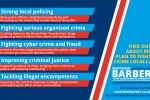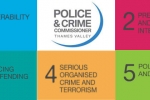100 arrests, £65,000 in cash seized and £17,000 worth of drugs taken off the streets
A week of action to target “County Lines” drug dealing has seen significant results with 100 people arrested, as well as significant cash and drugs seizures, as part of Operation Stronghold.
Between 7 October and 13 October 2019, Thames Valley Police officers across the region have been carrying out activity to target individuals concerned in “County Lines” drugs, as a result officers made 100 arrests for drugs supply and other associated offences.
dditionally £65,983 in cash was recovered and officers also seized 1,435 wraps of cocaine, crack cocaine and heroin worth over £17,000 pounds in cash.
17 weapons were also seized along with 118 mobile phones, with 166 stop and searches and 35 vehicle stop checks carried out.
Our officers identified 19 vulnerable people and worked with partners across the three counties to safeguard them and attended 100 addresses where ‘cuckooing’ has previously taken place.
Cuckooing is where drug dealers often entice a vulnerable person into allowing their home to be used for drug dealing by giving them free drugs or offering to pay for food or utilities.
The people they target are often lonely, isolated, or frequent drug users themselves.
The Thames Valley Police & Crime Commissioner is funding a theatre production for schools to education 15,000 children in the Thames Valley about the risks. Find out more on my website.
Channel 4 Dispatches: Police and council join forces in fight against county drugs lines
Thames Valley Police and Oxfordshire County Council have joined forces to combat county drugs lines. Filmed for Channel 4’s Dispatches programme, ‘Britain's Child Drug Runners’ shows police officers and social services working together in tackling the exploitation of vulnerable children to transport drugs in Oxford, Banbury and the surrounding areas.
The documentary, which aired on Wednesday 13 November at 10pm, shows the devastating impact that county drugs lines can have on children and their families. You can watch the programme again on the Channel 4 website by clicking here.
County drugs lines is the name given to drug dealing where organised criminal groups (OCGs) use phone lines to move and supply drugs, usually from cities into smaller towns and rural areas. They exploit vulnerable people, including children and those with mental health or addiction issues, by recruiting them to distribute the drugs, often referred to as ‘drug running’. OCGs often use high levels of violence and intimidation to protect the ‘county line’ and control them. One of these forms of control exploits vulnerable people by using their home as a base for dealing drugs, a process known as cuckooing. With over 6,000 OCGs and nearly 50,000 individuals involved, organised crime costs the UK more than £24 billion per year.
These threats from county lines mean that police and social services are urging people to look out for the signs that somebody is being exploited by these gangs. These signs can include persistently going missing from school or home and being found in other areas, unexplained money, new clothes or electronic devices, receiving high numbers of texts or phone calls, being secretive about who they are speaking to and significant changes in emotional or physical well-being.
If you’re concerned about drug-related crime in your area or think someone may be a victim of drug exploitation, please call Thames Valley Police on 101 or 999 in an emergency. You can also report online or contact Crimestoppers anonymously on 0800 555 111.
Commendations for exceptional bravery
Among those receiving awards at the latest Chief Constable's Commendation Ceremony were PC Matthew Robson and PC Matthew Hunt who both received a Higher Commendation. Such an award is given out when actions have been exceptional in reflecting force values.
On 15 December 2018 PC Robson and PC Hunt responded to reports that a van was travelling in the wrong direction on the M4 near Reading. After the officers had set up a rolling road block to stop oncoming traffic, the van was still travelling at speed the wrong way. In order to avoid a collision with the other traffic, PC Robson and PC Hunt took the decision to put themselves in the van’s path and steer into the side of it as it passed them. This stopped the van and undoubtedly prevented the driver of the van from causing serious injury or death to other road users.
The courage shown by both the officers exemplifies the bravery, selflessness and self-sacrifice that officers make every day from a local to national level. They put themselves in a vulnerable situation at serious risk of personal harm in order to protect members of the public. Thankfully, through their expertise and skill the officers brought the incident to a successful conclusion and they deserve all the praise coming their way!
At the ceremony in October a number of other officers, staff and members of the public were presented with award by the Chief Constable and the High Sheriff of Buckinghamshire to recognise their outstanding work and commitment.
Victims First launches video to help young people spot the signs of relationship abuse
Victims First, which supports victims of crime and abuse across Berkshire, Buckinghamshire and Oxfordshire, has launched a video to raise awareness of coercive control and emotional abuse in relationships.
Coercive control became a criminal offence in 2015 and involves an act or a pattern of acts of assault, threats, humiliation and intimidation or other abuse by a perpetrator that is used to harm, punish or frighten their victim.
Although many people associate domestic abuse with physical violence, coercive control recognises the damaging impact of other forms of abuse in relationships as well.
‘Don’t Disappear’ follows the story of Jamie and Emma, from the seemingly loving early stages of their relationship, to the development of abusive behaviour.
The video covers a range of controlling behaviours exhibited from Jamie to Emma including:
- Jealousy and possessiveness including accusations of flirting and cheating
- Isolating her from her family and friends
- Controlling the use of her phone and social media
- Constantly checking on her whereabouts
- Sudden outbursts of anger and mood changes, and
- Love bombing - showering her with excessive affection and attention in order to retain control
‘Don’t Disappear’ can be viewed on You Tube at https://youtu.be/d6rt8w5HBWw, the Victims First website www.victims-first.org.uk, or on the Victims First Facebook page @VictimsFirstTV
Action on fraud - not Action Fraud
Since the revelations by The Times newspaper that unearthed the failings of Action Fraud earlier this year, no-one can be under any impression that the mechanism for dealing with fraud, online crime and scams is fit for purpose in this country. Although The Times and other news outlets trumpeted this disclosure with surprise, it has been widely acknowledged by many for some time that they system simply does not work.
Action Fraud is hosted by the City of London Police and the principle is simple enough. Fraud and online crime are unique by their lack of geographical footprint. Therefore we have a single point of contact across the nation for anyone to report. At this central point these reports can be collated and sent to the most appropriate police force to investigate further.
On paper, so far so good, but the reality of the situation and the limitations of the system mean that the service provided to the public falls well short of expectations. The press reports have highlighted the failure of the call handlers at Action Fraud to deal with members of the public appropriately and to record the offences correctly, but the failings are more systematic than just behavioural issues with staff...
Read the full article on my website...
Serious Organised Crime is just around the corner
Most people see serious organised crime as the subject of television drama. Quite exciting, fun to watch, a bit of a distraction from reality. Even when we do acknowledge it in the real world it is a phenomenon experienced in the big cities: London, Manchester, Liverpool and Birmingham. It’s not an issue here in places like Thames Valley is it? One of the greatest dangers of serious organised crime, and the challenges in tackling it, is a failure to recognise the reality of the problem in front of us.
The recently appointed Security Minister, Brandon Lewis, has launched a review of the Government’s strategy for tackling serious organised crime. I welcome this review - led by Sir Craig Mackey QPM, former Deputy Commissioner at the Met - as an opportunity to get the balance right between local, regional and national resources.
Serious Organised Crime, or “SOC” as it is known in policing, can take many forms from drug dealing to people trafficking, and money laundering to traditional acquisitive crime. The definition of SOC given by the Crown Prosecution Service is planned and coordinated criminal behaviour by people working together on a continuing basis.The response from the criminal justice system needs to be similarly planned and coordinated...
Read the full article on my website...
Make your voice heard to help shape the future!
The role of the Police & Crime Commissioner includes holding to Chief Constable to account, setting the council tax precept for policing, commissioning services for victims of crime, funding community safety partnerships and setting the policing priorities for the Thames Valley.
I want to know your views about policing where you live. Please spare a few moments to complete my short survey and tell me what you think is going well and what can be done better. Visit www.matthewbarber.co.uk/haveyoursay.
Please do spread the word and share the survey with friends and family!



